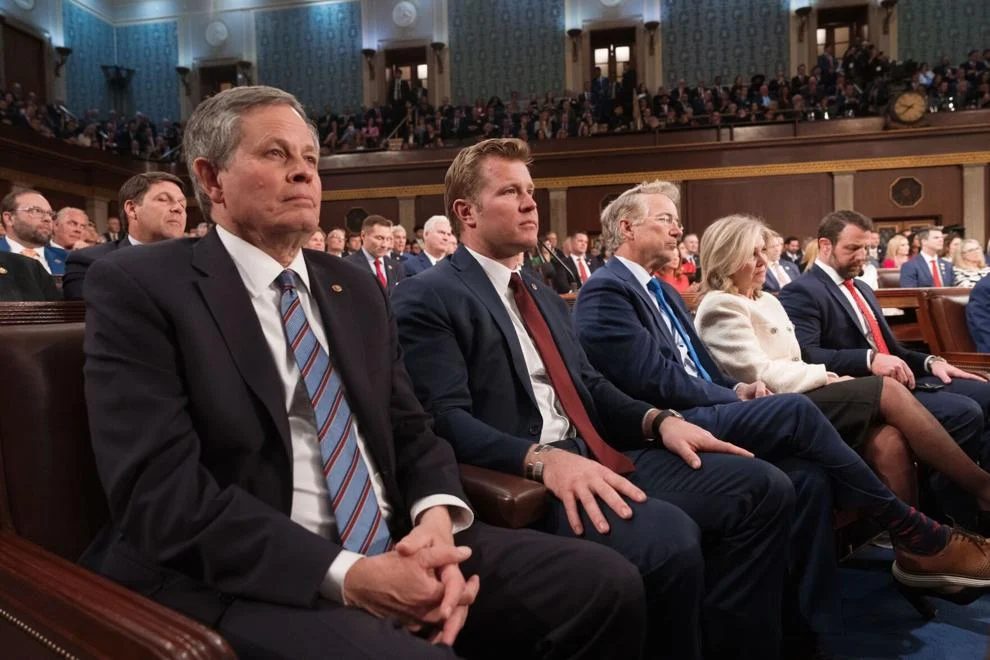Laurenz Busch Chronicle Staff Writer
May 1, 2025

One hundred days in, Tim Sheehy says he’s feeling good and proud as he supports the Trump administration’s agenda for change and pushes his unique ability to address wildfire reform from the halls of Congress.
As one of the youngest U.S. senators and member of a growing “warfighter” cohort of legislators, Sheehy, 39, is quickly making a name for himself.
The former Navy SEAL frequently appears on mainstream news channels. He is moving fast, introducing bills and sponsoring others, homing in on bipartisan efforts while hitting party lines on key votes to “fix as much as I can, then go home and move on with my life.”
“I don’t intend to make a career out of living in the U.S. Senate,” he recently told the Chronicle. “That’s what this country was founded on — citizen government. We bring the voice of our people to D.C., we fight for key policy priorities, we do our job, and then, we move on to make room for somebody else.”
The tactic is reminiscent of his time in the military, where he served tours around the globe and executed missions with gusto while never lingering too long.
But this time, Sheehy traded his military-issued rifle and helmet for a pen and suit. He’s embracing his new mission after a tough election while he shifts from a dogged campaigner to the legislator he ran to be.
“A new generation of leaders who are bringing a fresher perspective is needed — that’s what I’m proud to be bringing,” he said.
“I’m not here to audition for another job or cabinet position or prepare to run for reelection. I’m here to carry out the promises I made in my campaign.”
It wasn’t long ago that Sheehy’s oft-repeated stump speech rang through the minds of many Montanans — a speech where he prided himself on common sense and tangible, everyday goals with which the majority in the state agreed.
“Secure border. Safe streets. Cheap gas. Cops are good, criminals are bad. Boys are boys, girls are girls,” he’d say.
And largely, though his message hasn’t yet come to fruition, he’s doing exactly what he said he would do — regardless of whether people agree with him.
“We ran a campaign based on common sense,” he said. “And what we’re seeing nationwide is a return to that.”
Over the past three months, Sheehy went to work quickly, introducing 13 bills and co-sponsoring 134 others.
In early April, he was the first freshman senator to pass a bill out of U.S. Senate this session.
While he remains a staunch conservative and Trump supporter, Sheehy has also defied the polarization grasping the U.S. by targeting a niche industry he’s uniquely positioned to address.
And he’s done it with a high rate of bipartisanship — perhaps faster than he had intended.
In all, Sheehy has signed onto 15 bills to essentially restructure the U.S. wildland firefighting apparatus. One of the bills he introduced, allowing companies to purchase former military planes and plane parts, recently passed the Senate.
Just seven other bills have passed the Senate so far.
Sheehy, a former wildland firefighter and co-founder of the aerial firefighting company Bridger Aerospace, says he’s no stranger to the country’s response mechanism and its shortcomings.
“Our wildland fire landscape is very challenged, and we owe the American people better,” he said. “With my background I’ve been in a position to help with that.”
Rather than chasing “one, big, beautiful bill,” as Trump likes to say, Sheehy is tackling the issue from numerous approaches. That includes a bill to set response times, create a central response agency and improve firefighter wages.
“Most people don’t want their homes and communities burned to the ground, they want to see solutions,” he said. “I’m not trying to boil the ocean; I’m trying to focus on a handful of policy issues that I can impact.”
Just days after his inauguration, wildfire ripped through parts of Los Angeles, burning some 11,500 homes and causing up to $275 billion in damage. The tragedy catalyzed his efforts.
“I wasn’t planning on attacking that right out of the gate,” he said. “After L.A., it’s clear now’s the time.”
Democrats have signed onto 15 of the bills, including Sen. Catherine Cortez Masto of Nevada, Sen. Alex Padilla of California and Sen. Maria Cantwell of Washington.
Despite his bipartisan lean with wildfire reform, however, Sheehy also signed on to bills a Democrat likely wouldn’t touch.
These include abolishing the Department of Education, formally designating definitions of male and female, and deregulatinglead ammunition and tackle.
Sheehy also vocally supports Department of Defense Secretary Pete Hegseth and his commitment to support troops, or “warfighters.” He said he is continuing to work to revamp the lethality of the military.
Furthermore, a priority of the Trump administration has been to “unleash American energy,” which Sheehy and Montana Sen. Steve Daines have supported from an all-of-the-above approach.
Both have urged Trump to step in to boost the coal-fired Colstrip power plant.
In early April, the facility received a two-year exemption from the U.S. Environmental Protection Agency for meeting Biden-era emissions standards. Sheehy says that while new technologies such as artificial intelligence, cryptocurrency and electric vehicles continue to grow, the U.S. will need all the energy sources it can get.
He also highlighted nuclear — or the lack thereof — as an option that must progress.
On social media, the senator has been seen bouncing between Washington, D.C., and Gallatin County. Some days, he’ll post videos of him walking into the Senate for a vote. In others, he’s riding a tractor around his property outside of Belgrade or skiing at Big Sky.
While he’s already filed to run for reelection in 2030, Sheehy doesn’t appear worried about winning over the people of Montana via another campaign just yet.
Rather, he appears confident in his get-it-done approach, allowing the people of Montana to reassess when his first mission ends in January 2031.
“It’s liberating when you’re not looking at every word you say and worried about if I run for X in 10 years, how will they evaluate this?” Sheehy said of being in office.
“It’s a fresh perspective that’s focused on results. I’ve been very active in authoring and signing onto bills because I’m trying to get as much done as I can, as fast as I can.”
